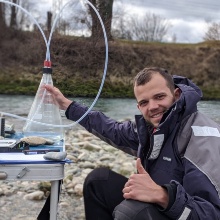Project Team¶
University of Stuttgart (Germany)¶
The permanent team of researchers working on this project from the University of Stuttgart includes:
Dr. sc. Sebastian Schwindt (Principal Investigator of the project)
Stefan Haun (PhD) (Head of Hydraulic Laboratory)
Prof. Dr.-Ing. Silke Wieprecht (Full professor, Department Head)
MSc. Maximilian Kunz (Doctoral researcher)
In addition, the project will be aided by the university’s innovative graduation students.
Dr. sc. Sebastian Schwindt is the head of the hydro-morphodynamics research group Institute for Modelling Hydraulic and Environmental Systems (IWS, University of Stuttgart). His research focuses on numerical analyses, Python programming, sediment transport, ecohydraulics, and ecosystem design. He completed his Bachelor (2010) and Master (2012) studies at the Technical University of Munich (Germany) in Environmental Engineering and accomplished his doctorate at the Ecole Polytechnique fédérale de Lausanne (EPFL, Switzerland). Between 2017 and 2019, Sebastian Schwindt pursued postdoctoral research at the University of California, Davis (USA) with Prof. Greg Pasternack. The emphasis of his postdoctoral research was on the ecohydraulic enhancement of the Yuba River (California, USA). In this project, he is the PI on behalf of the research team from the University of Stuttgart.
Prof. Dr.-Ing. Silke Wieprecht is the Head of the Department of Hydraulic Engineering and Water Resources Management (LWW) at the IWS (University of Stuttgart). She has long-standing experience in hydraulic engineering with a focus on sediment transport since her early career. Silke Wieprecht completed her doctorate at the University of the Federal Armed Forces in Munich and afterwards worked at the Federal Institute of Hydrology in the field of water morphology. Since 2003, she is the head of LWW. Her outstanding scientific contributions in the field of erosion and sedimentation research along with her proficiency in project planning, design, and implementation were awarded with the Qian Ning Prize in 2019. Recent research highlights from Silke Wieprecht involves novel findings about riverbed clogging (also known as colmation), which relates to vertical connectivity. Find out more about Silke Wieprecht and her awarded research on her personal website.
Dr. Stefan Haun is the head of the Hydraulic Laboratory of the Department of Hydraulic Engineering and Water Resources Management (LWW) at the IWS (University of Stuttgart). Stefan Haun completed his PhD at the Department of Hydraulic and Environmental Engineering of the NTNU (Norwegian University of Science and Technology, Norway) with a focus on three-dimensional numerical modelling. Since he joint the LWW in 2014, his research focuses on reservoir sedimentation, experimental methods in the field and in the lab, and sediment transport in general. Highlights of his recent research include the PHOTOgrammetric Sediment Erosion Detection (PHOTOSED) method and the AMSTEL project on micro plastic in rivers. He and his team of the hydraulic lab support this project with their expertise in fieldwork methods for collecting essential data such as grain size information or the degree of riverbed clogging.
MSc. Maximilian Kunz is a doctoral researcher at LWW. He focuses on the development of numerical models, ecomorphological assessments (vertical and lateral connectivity), and automation techniques in the model chain with principle component analysis (PCA). He studied Civil Engineering on the Bachelor and Master level at the University of Stuttgart, with Water and Environment as his main field of study. During his Master studies, he spent one semester at the Norwegian University of Science and Technology (NTNU) to broaden his knowledge in the field of Hydropower Development. In his Master thesis he focused on 3-D numerical modelling of reservoir flushing with partial drawdown. Parallel to his studies he gained professional experience by working for Wald + Corbe Consulting GmbH in Stuttgart. His work included the assistance in all work phases of several construction projects in the field of flood protection and ecological connectivity.
Grad Students: Opportunities for Bachelor and Master Theses within this project are already available on IWS’ website. Currently, we are looking for undergrad or grad students who want to write a study thesis on the following topics:
NCEPU and YTU (China)¶
Researchers from NCEPU (North China Electric Power University) and Yantai University (YTU) include:
Prof. Dr.-Ing. Shanghong Zhang (Principal investigator at NCEPU)
Prof. Dr.-Ing. Changming Ji (Professor at NCEPU)
Prof. Dr.-Ing. Baohui Men (Professor at NCEPU)
Prof. Zhang Cheng (Associate professor at NCEPU)
Prof. Dr.-Ing. Jin Zhang (Associate professor at YPU)
Prof. Shiyang Yin (Associate professor at NCEPU)
Prof. Caihong Tang (Assistant professor at NCEPU)
Dr. Wang Le (Lecturer at NCEPU)
Dr. Changqing Meng (Lecturer at NCEPU)
Dr. Wei Miao (Lecturer at NCEPU)
Prof. Dr.-Ing. Shanghong Zhang is the Head of the School of water resources and hydropower engineering at North China Electric Power University (NCEPU). In this China-Germany collaborative project, Prof. Zhang is the principle investigator (PI) to lead the Chinese team (NCEPU & YTU) on the implementation of this program. Prof. Zhang received his BEng and PhD degrees in Hydraulic Engineering at the Tsinghua University between 2000 and 2004, then he held a Postdoctoral Research Associate position at the Tsinghua University between 2004 and 2008 before he moved to NCEPU. Highlights from Prof. Zhang research primarily focus on the development of hydrodynamic modelling, digital watershed simulation, and decision supporting system. Recently, Prof. Zhang was also PI for key research programs funded by NSFC (National Natural Science Foundation of China) and MOST (Ministry of Science and Technology, China), and he was awarded the China Navigation Science and Technology Prize, and the DaYu Water Conservancy Science and Technology Prize. Read more on his institutional profile.
Prof. Dr.-Ing. Changming Ji is a distinguished pioneer in establishing the discipline of water resource & hydrology and honorable member in founding the school of water resources and hydropower engineering at NCEPU. He is an engineering undergraduate and postgraduate (Master & Doctorate) of Wuhan University of Hydraulic and Electrical Engineering between 1978 and 1988. In 1990, He completed his postdoctoral research at the University of California, Davis (USA). Since 1978, He was devoted to the research and courses of water resources management & hydrology as well as management of hydraulic engineering works. Prof. Changming Ji is a Fellow of China Society of Natural Resources and Editorial member of Journal of Hydroelectric Engineering, etc. He is a highly respected consultant to hydropower engineering in Ministry of Water Resources and his great contribution is officially praised by the State Council. Read more on his institutional profile.
Prof. Dr.-Ing. Baohui Meng completed his doctorate at Sichuan University and joined NCEPU in 2006. His study interests cover a wide field within fluvial water system, including time series analysis, management, optimal allocation of water resources, healthy river assessment and ecological water demand, optimal reservoir operation scheme, water environmental capacity, and water contamination tolerance capacity, etc. He was an invited expert in evaluating submitted scientific programs in National Natural Science Foundation of China (NSFC), Beijing Municipal Natural Science Foundation, etc. He was also the principle investigator of several sub project of National High Technology Research and Development Program of China. In this collaborative program, Prof. Men and Associate Prof. Yin will work together on the healthy river assessment and flow regulation refinement based on multiple purposes in the downstream of Yellow River. Read more on his institutional profile.
Dr. Zhang Cheng is a member of the School Water Resources and Hydropower Engineering for Modelling Hydraulic and River Mechanics (North China Electric Power University). His research focuses on numerical analyses, the operation and control of water conveyance project. He completed his Bachelor (2004) studies at the Wuhan University (Wuhan, PRC) in Hydraulic Engineering and accomplished his doctorate(2008) at the Tsinghua University (Beijing, PRC). Between 2008 and 2010, Zhang Cheng pursued postdoctoral research at Tsinghua University with Prof. Zhang Jianmin. The emphasis of his postdoctoral research was on the operation and dispatch of the South-to-North Water Diversion Project (PRC). In this Sino-German collaboration project, he will cooperate with Doctor Zhang Jin and Doctor Tang Caihong to study river ecosystem response mechanism based on hydrology connection, field monitoring of water ecology, and collecting high precision landform data. Read more on his institutional profile.
Dr.-Ing. Jin Zhang, an associate Professor of Yantai University (personal website https://civilen.ytu.edu.cn/info/1235/8231.htm), major in water ecological environment and rehabilitation. Dr. -Ing. Jin Zhang completed her doctorate at the Department of Hydraulic Engineering and Water Resources Management (LWW) at the IWS, University of Stuttgart, under supervision of Prof. Wieprecht in 2014. Since 2007, Dr. -Ing. Jin Zhang has been studying urban river health and ecological rehabilitation for over ten years, she led NSFC projects on potential of fish habitat rehabilitation in urban rivers in plain/coastal areas, and studied its response to hydrodynamic and water quality enhancement. Since 2019, Dr. -Ing. Jin Zhang widened her research area from urban rivers to large scale watershed, worked on the ecosystem and habitats of the Yellow River estuary which might been influenced by the upper steam artificial water and sediment regulation, which is the research foundation for this project. In this NSFC-DFG project, she will work on the Ecological Response to Changes of Hydrological Connectivity.
Dr. Shiyang Yin was graduated from Water conservancy and civil engineering of China Agricultural University in 2006. Then He was accepted for direct admission to the M.S. program at China Agricultural University and gained his M.S. degree in 2008. Between 2008 and 2014, He participated Beijing Water Science and Technology Institute as a Engineer&Senior engineer.He undertook the doctorate research at China University of Geosciences (Beijing) between 2014 and 2018 . Dr. Shiyang Yin joined the NCEPU as a associate professor in September 2018. Prior to this. His research primarily focuses on distributed hydrological model and its application and reclaimed water resused and its impact. He also participated in and took charge of 30 national 863 plans, science and technology support projects, industry public welfare projects, major science and technology projects in Beijing, and Beijing water science and technology projects. He was selected in the 2012 Excellent Talent Project of the Organization Department of Beijing Municipal Committee. In this joint program, He will work on the package of hydrologic model model simulation. Read more on his institutional profile.
Dr. Le Wang was graduated from Beijing Forestry University (China) with B.S. in soil & water conservation engineering in 2007. Then He was accepted for direct admission to the M.S. program at Beijing Normal University and gained his M.S. degree in debris-flow dynamics in 2010. Between 2010 and 2015, He undertook the doctorate research on bed-load sediment transport and morphological changes in unsteady flows at Heriot-Watt University. Dr. Le Wang joined the NCEPU as a Lecturer in September 2019. Prior to this, He participated in a NSFC funded Post-Doctoral Research program in fluvial dynamics at Tsinghua University. His research primarily focuses on sediment transport and bed morpho-dynamics in unsteady flows, especially under a series of flood sequences. He is also keen on the study of non-homogeneous debris-flow formation, mobilisation and deposition. In this joint program, He will work on the package of hydrological connectivity through physical model simulation. Read more on his institutional profile.
Dr. Changqing Meng is a lecturer at the School of Water Resources and Hydropower Engineering at North China Electric Power University. Her research focuses on hydrological models, climate change and downscaling analysis. Dr. Changqing Meng completed her doctorate at the School of Hydropower & Information Engineering, Huazhong University of Science and Technology. Between 2017 and 2019, Dr. Changqing Meng pursued her postdoctoral research at the Tsinghua University. Her recent research focuses on the evolution process of basin water cycle factors under future climate change. She has been working with the National Natural Science Foundation of China Youth Science Fund Project (2019) and the General Fund for Basic Research Projects of Central Universities (2020). She has published more than ten academic papers and 5 academic papers have been included in SCI and she is mainly engaged in regional hydrological simulation and climate diagnosis, flood risk map compilation, mountain torrent disaster evaluation and other research work. In recent years, she has participated in national key research and development projects, key projects of the National Natural Science Foundation of China, and undertaken projects of the National Natural Science Foundation of China. Read more on her institutional profile.
Dr. Wei Miao is lecturer in school of Water Conservancy and Hydropower Engineering (NCEPU, North China Electric Power University). Her research focuses on flume experiment, image technique, sediment transport, and flow coherent structure. She completed his Bachelor (2012) study at Beijing Forestry University (Beijing, China) in soil and water conservation, and accomplished her doctorate (2018) at Tsinghua University (Beijing, China). Between 2018 and 2020, she pursued postdoctoral research at Tsinghua University with Prof. Danxun Li. In her postdoctoral research she focused on the Characteristics of Rainstorm, Flood and Sediment Yield in the Upper Changjiang River. In this project, she will participate in designing the physical model of lateral river connectivity and mechanism experiments about diffusion of water, sediment and organic mater on micro topography. And she will take part in remote sensing interpretation at yellow river.
Dr. Caihong Tang is an assistant professor in North China Electric Power University (NCEPU). She completed the Bachelor in Hydrology and Water Resources Research from NCEPU in 2013, and got the Ph. D. in Environmental Science from Beijing Normal University in 2020. She worked in Massachusetts Institute of Technology as a visiting scholar and joined NCEPU since 2020. Now she collaborates with Prof. Shanghong Zhang for postdoctoral research. Her research focuses on the water environment simulation, effects of vegetation on sediment resuspension, and lake ecological response to water transfer. In this joint project, she would like to explore the lateral connectivity of the Yellow River under flood stress by studying the ecological response of riparian vegetation system to the human activities and climate changes. Specific work mainly includes three parts: numerical modeling of water and sediment for the local reach of the Yellow River, dynamic simulation of vegetation growth and diffusion, and resilience analysis of riparian vegetation system.



